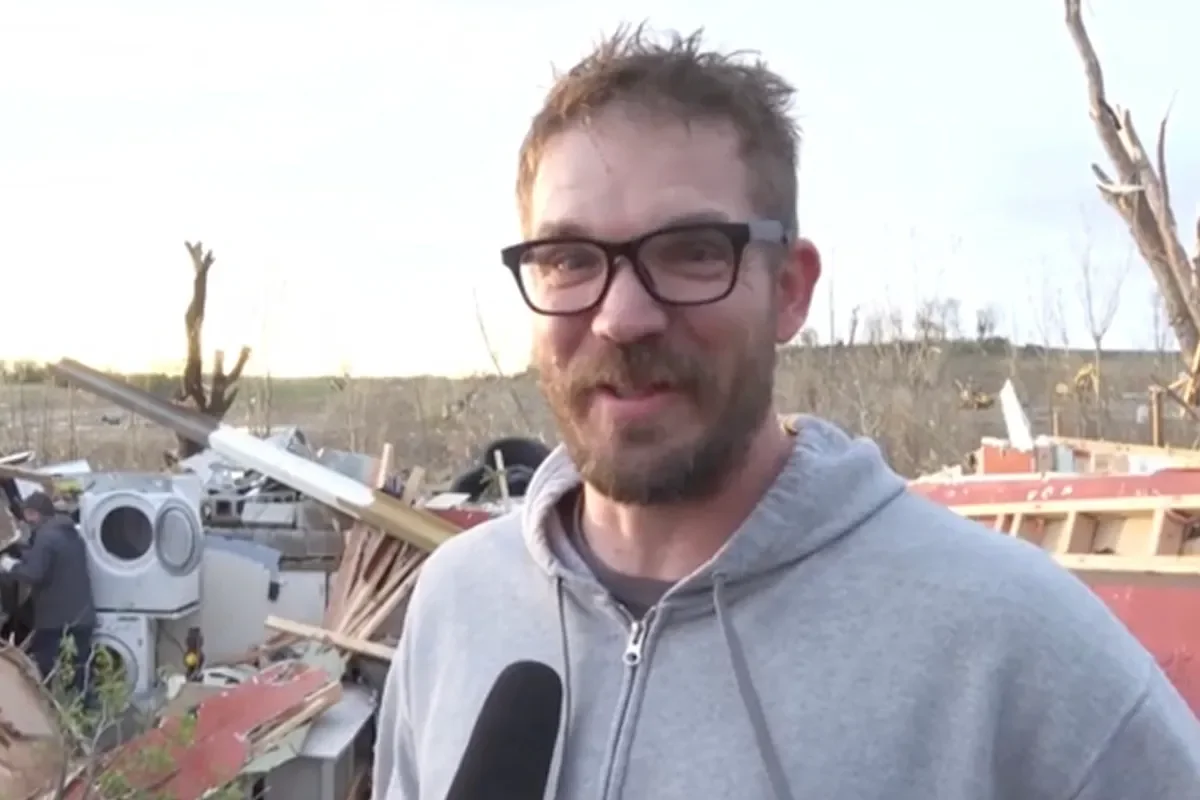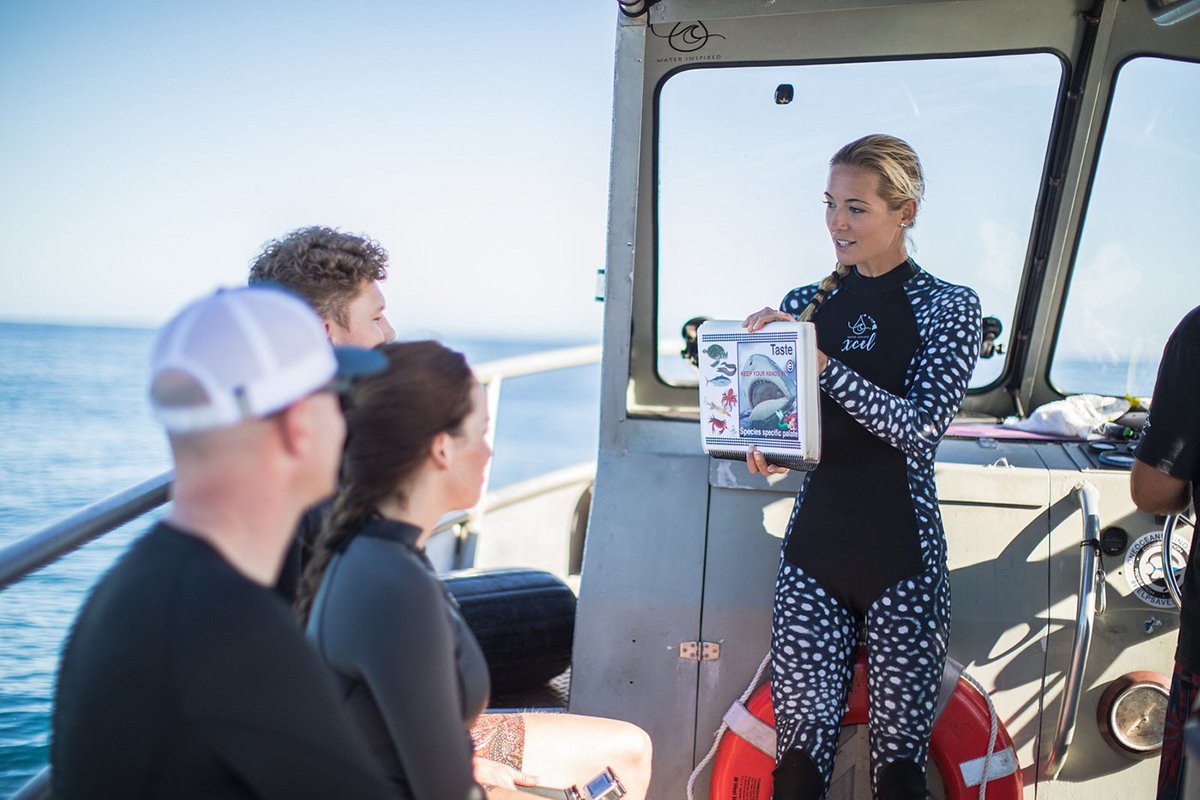

I had the unique opportunity to face my fear of sharks, thanks to the one and only Ocean Ramsey, a marine conservationist, free diver, and nonprofit founder. Ocean’s incredible close-up work with large, predatory sharks, particularly her signature “redirecting” technique, leaves a lasting impression on anyone who witnesses it. I also had the chance to ask Ocean some of the questions we all have when we see videos of her interacting with great whites, tiger sharks, and more.
On the day of my shark dive, I boarded Ocean Ramsey’s company boat at One Ocean Diving and headed three miles off Oahu’s North Shore. Staff briefed us on what to expect during the tour, which won the Tripadvisor Travelers’ Choice Award for Shark Diving in 2023. The company has a 100% safety record, but I was nervous.
When I first slipped into the water, I clung to the rope lashed to the side of the boat and watched in amazement as 30-40 sharks swam peacefully beneath us. Once I descended into the water, into their world, my fears began to dissipate like the air bubbles rising from my snorkel. I let go of the rope and free dove under the watchful eye of a safety diver.
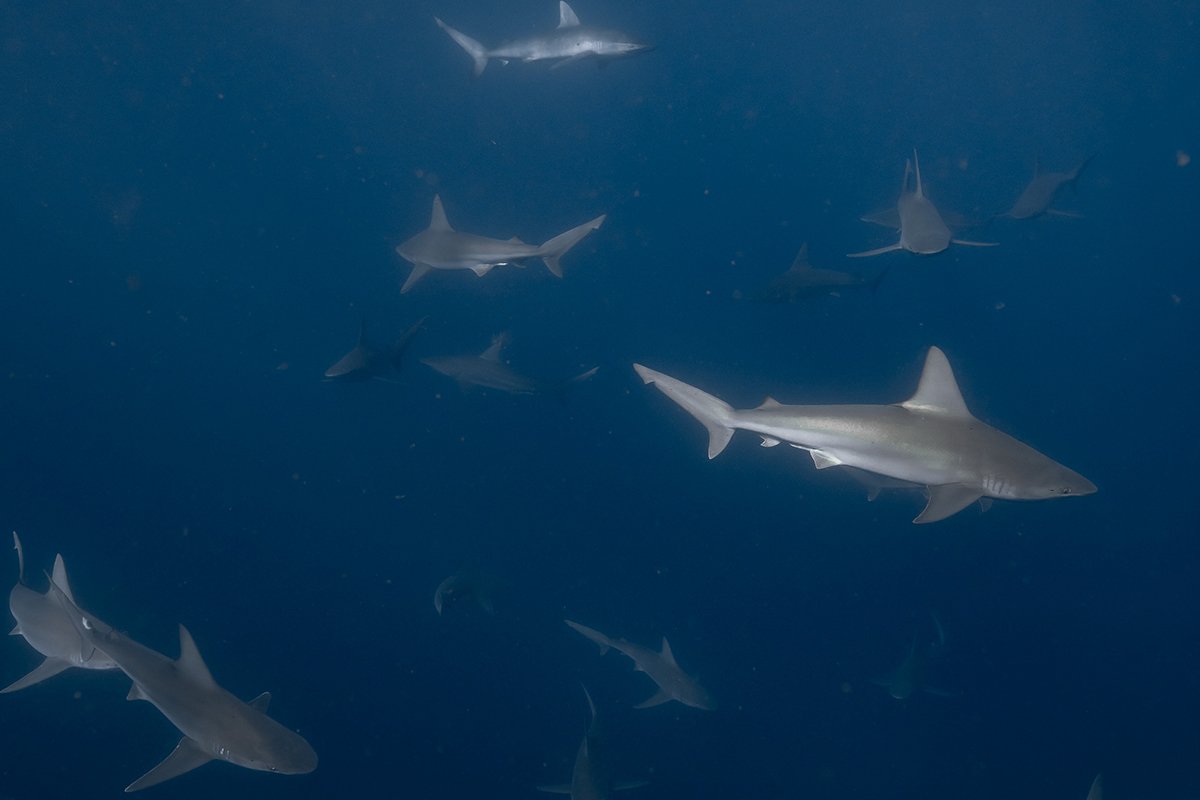
What changed in me in that moment that allowed me to see sharks in a whole new light? I don’t know, but that change is what Ocean Ramsey is creating in the world through her conservation work, her social media platform, and her multifaceted educational outreach.
I asked about her work and more during our interview. She did not hold back.
Outdoors.com: What effect do you think it has on people when they see your jaw-dropping images free diving with [some] of the largest great whites alive?
Ocean Ramsey: I’ve worked with over 30 species of sharks around the world for more than two decades and most of my research focuses on larger predatory sharks, but my main passion, goal, and work has focused on conservation efforts to help gain support for the protection of sharks from wasteful killing by addressing the core fear that stop people from caring about or wanting to protect sharks.
People don’t want to “save” or “protect a monster,” and sharks are not monsters, they are in fact, important apex predators. I don’t wish for people to look at them as a harmless puppy. In fact, puppies and dogs actually bite a lot of people, and if you look at the statistics, even for deaths related to ocean-going activities, people are disproportionately afraid of sharks when they should really be more concerned about drownings, jellyfish, and pretty much everything else.
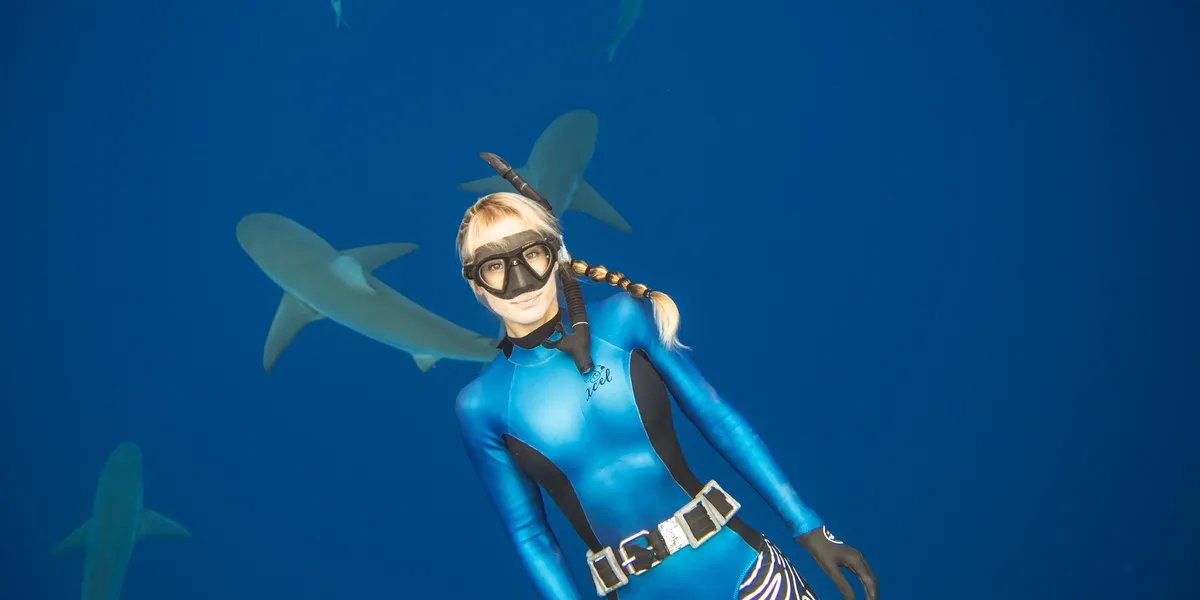
So I found that the most impactful way to help educate and also inspire people about sharks, their importance, and inspire and encourage them to get involved with shark and marine conservation [is to] teach people how to coexist. Otherwise, that separation keeps them from a connection that leads to active conservation.
When someone has a personal experience or better understands something, they are more likely to speak from their personal experience, even if it contradicts the social norms, which is what happened to me.
I grew up diving with sharks, and so my perspective more than 20 years ago was not as popular as I hope I’ve helped it to become via the use of captivating imagery [. . . ] and educational platforms like One Ocean Diving, which allow the public to join our research and conservation dives to learn about the biology, physiology, and behavior of sharks and specifically how that information relates to their own behavioral modification as an ocean-goer to be safer and have more respectful interactions, which is where techniques for redirecting a shark come into play.
I’ve now trained more than 20 professionals—most of the other biologists you see in social media redirecting sharks were trained by me—to work with sharks as professional guides. It is necessary to redirect a large shark or risk a bite. This is a necessary part of working with a predatory species.
My team and I share a lot of information for emergency purposes on how to redirect [a shark] in an emergency—[e.g.,] you are approached by a large shark while swimming, surfing, or diving on your own. This is important information for public safety, and it wasn’t previously known or shared prior to my development of the techniques. And as a surfer, swimmer, and diver, it is information I wish I had known growing up, so I published a book that took more than four years to write.
We encourage people to learn to coexist in hopes they will be inspired [. . .] to see that they are not the mindless monsters they’ve been portrayed as for generations. Connection leads to caring and that leads to support for conservation.
Connection leads to caring and that leads to support for conservation.
Ocean Ramsey
Outdoors.com: Are there certain types of sharks that you won’t redirect? Or are there certain situations in which you take a different approach?
Ocean Ramsey: At OneOceanDiving, we ask people not to touch the sharks, but we teach people how to redirect in an emergency first by extending their fins towards them. All biologists are trained up as professional shark-safety divers who must gain experience in actual redirections of all three larger predatory species using different methods before they are allowed to guide people without a seasoned trainer beside them. This allows for the guide and guests to remain safe if a more inquisitive (potentially starving shark) approaches and needs to be physically redirected to maintain space. Otherwise, they could risk a bite. There are different methods depending on the size, approach, and behavior of the shark or sharks.
Outdoors.com: What do you believe is the best approach for people who want to change their innate fear of sharks and instead focus on how special and beneficial they are to the marine ecosystem?
Ocean Ramsey: Education. The most impactful change I’ve seen is from the educational dives via OneOceanDiving, so I promote that a lot, because it facilitates a life and mind-changing shift for people. Within less than two hours, people are pumped full of information and inspired through that information and real experience to be able to speak up for [sharks] from an educated and personal first-hand perspective.
Outdoors.com: What advice would you give to people who spend time outdoors in a shark’s world—for instance, surfers, kayakers, paddleboarders, etc.? Can we share the same space safely?
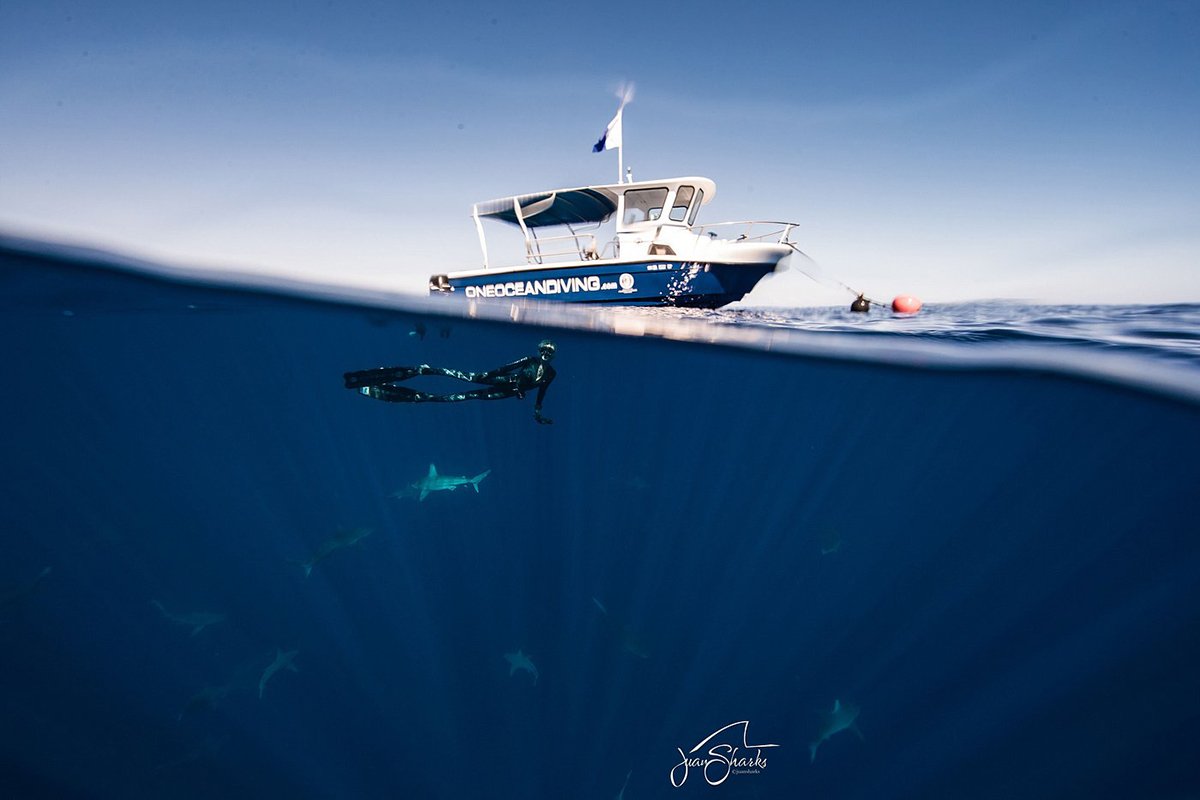
Ocean Ramsey: Yes, if we adapt our behavior to their known behavior and factor that [in] as well as environmental and geo-specific information in, we can definitely share the same space in a mutually respectful way. Sharks are incredibly capable, but they are not mindless monsters.
Outdoors.com: Can you describe those moments in the water with a shark when you really feel a connection? What is that like?
Ocean Ramsey: I lack the ability to eloquently articulate the enormous and incredible feeling that comes from the many interactions I’ve had. However, it’s more than humbling and feels like the deepest honor to be graced by their presence and to receive as much patience from them as I have is truly humbling and not taken for granted. I do not wish to test their patience, but I actively seek to learn, and so I do stay in the water in the most intense situations, as I hope to learn and pass that information on to others.
I do so at my own risk but as a calculated risk and am very open about the risk from my profession—working with sharks in open ocean—potentially being a potential cause of death for me, because I stay in water during some of the more intense moments. So on record, once again, if I am killed by a shark, that was my fault for staying in or not looking around enough.
I also want to say that I’ve been in multiple car accidents, none of which were my fault [. . .] and so I still feel safer in the water with the sharks that I do driving down the road. Humans are a lot more emotional and easily distracted. Sharks are very energy conservative. Just something to think about.
It’s more than humbling and feels like the deepest honor to be graced by [sharks’] presence and to receive as much patience from them as I have is truly humbling and not taken for granted.
Ocean Ramsey
Here are Ocean’s suggestions for 10 ways to help conserve sharks.
